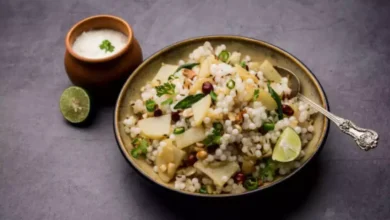Consume, have fun, and laugh
Even if you’ve tried every diet known to man, hunger and strong cravings—like the sudden drive to scarf down McNuggets—always win out. It’s very hard to follow no-dairy, no-meat, no-sugar diets. Fad diets usually promise fast and rapid weight reduction, but because of their drastic methods, they seldom live up to the hype.

A new way to manage wellbeing without starving yourself and make health objectives feasible emerges amid all the mental havoc these diets have caused. It’s a technique known as intuitive eating, and it helps you reframe your connection with food so that you feel satisfied rather than wanting more.
Conscientious Consumption
Is it vital to eat just when you are really hungry? “Food freedom means moving away from calorie counting and diet for optimal wellbeing, without wanting to suppress feelings about food,” explains celebrity nutritionist Karishma Chawla. That’s intuitive, attentive eating for improved health. It entails letting go of conventional diet conventions about body type, diets, mental guilt, and other related topics. Eating meals that are in line with my spirit is what I mean when I talk about food freedom. Recognize that eating well keeps you healthy and creates space for development; it’s not a punishment but rather a reward for your body.”
Now, take a moment to think before reaching for that bag of pumpkin seeds. Recognize the cues from your body. “The goal of intuitive eating is to train your body to transmit signals that will improve your health. For a healthy body and way of life, you eat guilt-free yet thoughtfully, paying close attention to the amount and kind of food you put in your mouth.
Food independence, according to dietician Deepalekha Bhattacharjee, is giving up on following fads and assuming total control over your eating habits. This implies that you are ultimately responsible for deciding when, what, and how much to consume. Rather than heedlessly following your mind, which has the power to both trick and indulge you by luring you into eating anytime it senses that you are straying from your diet (read: lack of sleep, stress, strong emotions, binge eating, demanding travel schedules, social pressure).
She attests to the fact that timing your meals may help you educate your body and mind to follow a self-imposed routine, since “feeling hungry” is only around 10% of the time an accurate indicator. “After a few months, you’ll begin to feel hungry at the times that you choose. When you have complete control over what, when, and how much you eat, it is genuine food freedom, according to Bhattacharjee.
Pleasurably Well
Have faith in yourself and find satisfaction in your appropriate decisions. Making room for a balanced intake depending on what suits you is part of this. “Enjoy a wide range of options from all five food groups, guilt-free and without restrictions, and keep a positive relationship with food.” This mindset fosters trust and enables you to react to food sensibly and make choices that are in line with your own health index. Discover your own fulfilling and healthful connection with food, advises Nutracy Lifestyle creator and nutritionist Dr. Rohini Patil.
You may overcome your unhealthy fixation with weight concerns with intuitive eating. You may establish your own limits and live in harmony. Sounds difficult? It’s not. You start to treat your body better, appreciate, love, and savor your food. This carries over into leading a healthy lifestyle as you include methods of self-nourishment outside of food.
According to functional dietitian Madhavi Avate, “Once you shrug off those rigid rules, or guilt, you begin honouring your hunger, and your fullness cues.” She discusses the benefits of picking your meals and paying attention to your body’s signals. Three essential components form the foundation of an intuitive eating plan: paying attention to your body’s signals of hunger and fullness, giving in to actual hunger, and ceasing eating when you’re pleasantly full. Second, it promotes giving in to your appetites without passing judgment and cultivating a healthy, balanced relationship with food by accepting a broad range of options. Finally, it is crucial to practice mindful eating, which entails being present throughout meals to completely savor and enjoy food, as well as improving self-awareness and happiness with your eating patterns.
Gain-Win
This is your remedy if you have been accused of body-shaming your children when you propose or enforce a ban on the Swiggy culture of fast fixes. “Intuitive eating concepts can help kids and teenagers avoid eating disorders, have a healthy relationship with food, and support a positive body image,” adds Rohini. Parents may help children develop intuitive eating skills by bringing in a variety of nutrient-dense meals, encouraging them to pay attention to their hunger and fullness signals, and modeling balanced eating habits.
“Pay attention to your gut; a healthy gut is naturally very perceptive. Your gut microorganisms will only cry out when they are very hungry if you take care of them. If you provide them with an unfavorable environment, such as stress and junk food, the overabundance of harmful bacteria will lead to rogue desires, says Karishma.
Remember that although this kind of food independence may not result in significant weight reduction, it will undoubtedly improve your mood and general health.
Joyful Consumption
● Consume food until 80% full.
● Determine the amount in advance
● Savor food without any guilt
Consider using your hands to eat.
● Work out every day to reduce cravings
Remain upbeat and maintain discipline.
● Feed your body in harmony







